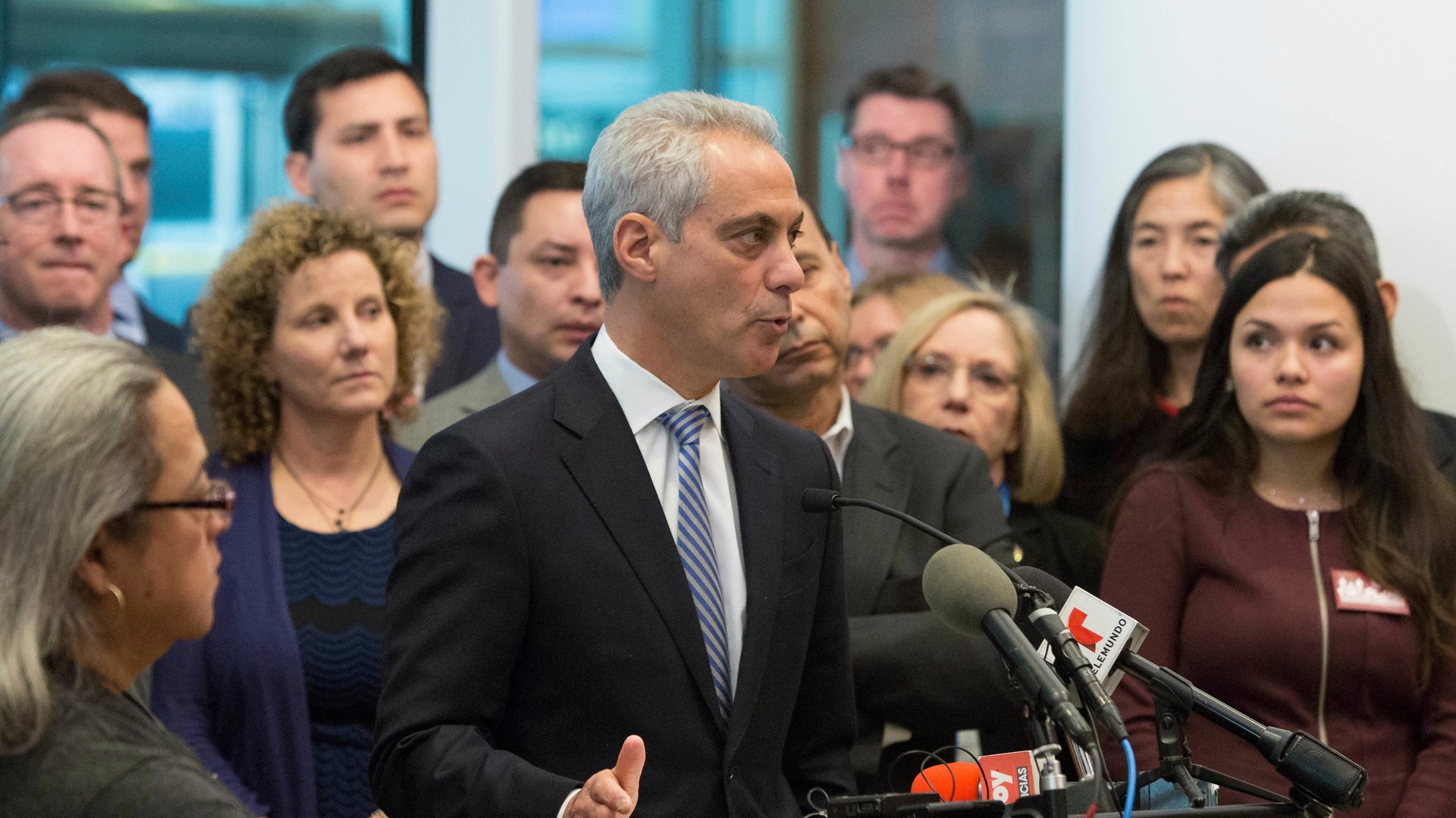Mayors of America’s biggest cities are standing up to Trump on immigration
President-elect Donald Trump has vowed to deport up to three million undocumented immigrants residing in the United States. But a few big-city mayors say otherwise.


President-elect Donald Trump has vowed to deport up to three million undocumented immigrants residing in the United States. But a few big-city mayors say otherwise.
Elected officials in Chicago, Seattle, and a number of so-called “sanctuary cities” have promised to push back against possibly forthcoming federal crackdowns on individuals living in the United States illegally. “You are safe in Chicago. You are secure in Chicago. And you are supported in Chicago,” Chicago mayor Rahm Emanuel declared at a news conference on Tuesday (Nov. 15). “This is a city of inclusion.”
Emanuel, a former chief of staff to president Barack Obama, has proposed making municipal identification cards available to undocumented immigrants so that they might have access to a number of public utilities—schools, city-funded healthcare, etc. Chicago’s city council is expected to approve the plan.
Emanuel’s recommitment to the sanctuary-city movement a sentiment echoed in city halls across the country. “These are our neighbors, and we will continue to support our neighbors,” Seattle mayor Ed Murray said on Nov. 9, reaffirming Seattle’s sanctuary status a day after Trump declared victory in the Electoral College. “Seattle is the same city today that it was yesterday … guided by equality and inclusion and openness.”
Other mayors to publicly reaffirm their cities’ sanctuary statuses in the wake of Trump’s win include San Francisco’s Ed Lee, Philadelphia’s Jim Kenney, Los Angeles’s Eric Garcetti, New York’s Bill de Blasio, and Austin’s Steve Adler. Overall, there are 340-some localities considered “sanctuaries” for undocumented individuals in the United States.
Sanctuary cities work by essentially not cooperating with federal immigration authorities. Generally, this means not detaining undocumented immigrants caught committing minor crimes (though they’ll usually pay a fee, like most citizens). City governments may also enact policies barring officials from inquiring as to an individual’s immigration status, or reporting undocumented residents to outside authorities.
These strategies aren’t blindly partisan. They have practical utility to the people who run cities. “Detainer requests” issued by US Immigration and Customs Enforcement (ICE) are not formal warrants or legally binding. Erroneously detaining a US citizen by way of an ICE detainer request could open city governments and police departments to expensive civil-rights lawsuits. Similarly, sheriffs and police departments across the country have found that sanctuary-city policies make policing easier. Undocumented immigrants are more likely to talk with law enforcement officers if they know their immigration status won’t be an issue.
Donald Trump has threatened to cut off federal funding to sanctuary cities as president, but most mayors remain unshaken. Seattle may implement a new tax to make up for lost federal funds—something that may or may not be sufficient to make up the difference.
Such models, should they succeed, threaten to widen the gulf between rural and urban America, with American cities becoming self-sufficient, ideologically liberal microcosms dotting a conservative horizon. Perhaps that’s a melodramatic prediction, but it’s not entirely without basis.
As Quartz’s Max de Haldevang learned in his interview with social scientist Benjamin Barber, “Over the last 10 years we have already seen a powerful emergence of cities as primary spaces for progressive and majority action, for the protection of diversity, for dealing with immigration to the US, higher minimum wage, gender relations and so on.”
Barber says contrast between urban and rural communities is precipitating the “the devolution of authority and power and moral authority,” and perhaps “the breakdown of national governments.” And the issue of immigration may be ground zero.